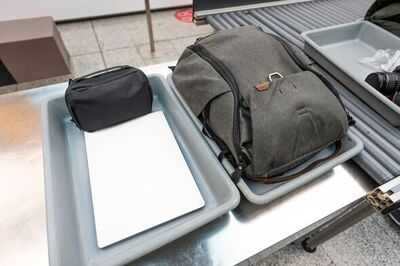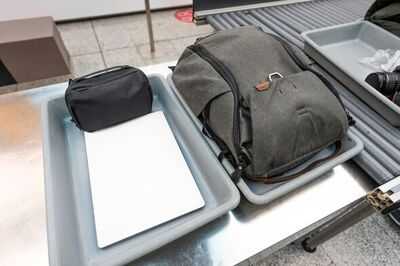
Every airline enforces their own regulations, including restrictions on hand luggage dimensions and whether passengers may bring their own refreshments onboard. However, one obscure security regulation can still trip up even experienced flyers, and it relates to electronic devices.
This regulation is universal across all carriers, so whether you're travelling with TUI, British Airways, Ryanair, or easyJet, adhering to these requirements is essential. Airlines permit certain electronic devices in carry-on baggage, such as mobile phones, laptops, and tablets, and you'll likely be bringing at least one aboard for entertainment purposes.

Nevertheless, if any of these gadgets have a dead battery, you might encounter a challenging situation at security, reports the Mirror.
Electronic devices must be powered up, as security personnel may request you to turn these items on.
Should you be unable to do so, they may deny you passage through security, halting your journey.
The UK government's official website, which provides extensive travel guidance and updates, states: "Make sure your electronic devices are charged before you travel. If your device does not switch on when requested, you will not be allowed to take it onto the aircraft."
Should you err by leaving an uncharged device in your luggage, your alternatives will vary depending on your departure country and chosen airline.
One possibility is placing it in your hold luggage if it hasn't already been checked in.
British Airways has issued a warning to passengers on its website, stating: "Please ensure that any items in your hand baggage are fully charged and switched on before you arrive at the airport. If your device is not charged, please place it in your checked baggage."
The airline further advises: "If you are connecting, make sure that you do not deplete power in your devices during the first part of your journey as charging points at airports might be very limited and you may need an adapter."
For those who find themselves unable to pass through security due to uncharged devices, British Airways suggests considering rebooking onto a later flight from London Heathrow Airport, allowing time to charge their device.
However, the airline warns: "A fee might apply for changing your booking, subject to your ticket type", indicating that a flat battery could prove to be an expensive error.
In addition, BA recommends leaving your goods at "Bagport, who operate the lost property office in London Heathrow."
Passengers will then receive a reference number and must contact Bagport upon reaching their destination to arrange retrieval of the item.
TUITUI also offers advice, stating: "If you're carrying any electronic devices in your hand luggage that are capable of holding a charge, you'll need to make sure they're fully charged when you go through airport security. This is part of new security measures that have been introduced by airports in the UK and abroad.
"We recommend you keep things like mobile phones switched on until you board the plane, as there might be more checks at the departure gate."
RyanairRyanair doesn't provide any additional guidance on its site. Under the FAQ 'What happens if my smartphone or tablet dies before airport security?', it states: "If you have already checked in online and your smartphone or tablet dies, you will receive a free of charge boarding pass at the airport."
However, it is not mentioned what your options would be if security refuses to let you through.
Find the latest information and advice on the Government website.
You may also like

Top doctor reveals why Trump suddenly got an MRI scan: 'Undisclosed medical problems...'

Grigor Dimitrov makes triumphant comeback 112 days after quitting Wimbledon match in tears

Woman 'lucky to be alive' after magpie attack leaves her with fractured neck

'Perfectly cast' Marvel movie with top rating finally confirms free streaming date

UK to spend £150m on underwater drones as Russia tensions mount







